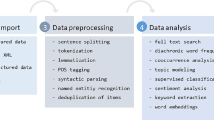Abstract
Data annotation is a critical but the most expensive step in any text analytics project. There have been several frameworks built for enabling and easing this step. Most of these frameworks are however either not easy to be configured to specific users’ needs, have no functionalities for annotating text pairs, or lack of efficient mechanism for data management and progress monitoring. Moreover, they have mostly no graphical user interfaces that are specifically designed for mobile devices. In this paper, we introduce Hannotate, a highly flexible, lightweight web-based framework that provides functionalities for a wide range of text annotation from both desktop and mobile devices. Our framework inherits the advantages of the typical existing ones while allowing users to easily customize the annotation work according to their demand and budget. The framework also supports users in managing data, monitoring the progress, and giving feedback to annotators.
H. Dao—Independent Researcher. Email: hoangdhph04904@gmail.com.
Access this chapter
Tax calculation will be finalised at checkout
Purchases are for personal use only
Similar content being viewed by others
Notes
- 1.
- 2.
- 3.
- 4.
- 5.
- 6.
- 7.
- 8.
- 9.
- 10.
- 11.
References
Bowman, S.R., Angeli, G., Potts, C., Manning, C.D.: A large annotated corpus for learning natural language inference. In: EMNLP 2015 (2015)
Cer, D., Diab, M., Agirre, E., Lopez-Gazpio, I., Specia, L.: Semeval-2017 task 1: semantic textual similarity multilingual and crosslingual focused evaluation. In: SemEval-2017 (2017)
De Castilho, R.E., et al.: A web-based tool for the integrated annotation of semantic and syntactic structures. In: COLING 2016 Workshop (2016)
Fort, K., Adda, G., Cohen, K.B.: Amazon mechanical turk: Gold mine or coal mine? Comput. Linguist. 37(2), 413–420 (2011)
Klie, J.C., Bugert, M., Boullosa, B., de Castilho, R.E., Gurevych, I.: The inception platform: machine-assisted and knowledge-oriented interactive annotation. In: COLING 2018 (2018)
Kovatchev, V., Martí, M.A., Salamó, M.: Warp-text: a web-based tool for annotating relationships between pairs of texts. In: COLING 2018 (2018)
Neves, M., Ševa, J.: An extensive review of tools for manual annotation of documents. Briefings Bioinf. 22(1), 146–163 (2021)
Pontiki, M., Papageorgiou, H., Galanis, D., Androutsopoulos, I., Pavlopoulos, J., Manandhar, S.: Semeval-2014 task 4: aspect based sentiment analysis. In: SemEval 2014 (2014)
Sabou, M., Bontcheva, K., Derczynski, L., Scharl, A.: Corpus annotation through crowdsourcing: Towards best practice guidelines. In: LREC’14 (2014)
Yang, J., Zhang, Y., Li, L., Li, X.: Yedda: a lightweight collaborative text span annotation tool. In: ACL 2018 (2018)
Acknowledgement
This work is supported by Vingroup Innovation Foundation (VINIF) in project code VINIF.2020.DA14
Author information
Authors and Affiliations
Corresponding author
Editor information
Editors and Affiliations
Rights and permissions
Copyright information
© 2023 The Author(s), under exclusive license to Springer Nature Switzerland AG
About this paper
Cite this paper
To, TT., Dao, H., Nguyen, H., Do, TH., Hoang, TA. (2023). Hannotate: Flexible Annotation for Text Analytics from Anywhere. In: Pesquita, C., et al. The Semantic Web: ESWC 2023 Satellite Events. ESWC 2023. Lecture Notes in Computer Science, vol 13998. Springer, Cham. https://doi.org/10.1007/978-3-031-43458-7_24
Download citation
DOI: https://doi.org/10.1007/978-3-031-43458-7_24
Published:
Publisher Name: Springer, Cham
Print ISBN: 978-3-031-43457-0
Online ISBN: 978-3-031-43458-7
eBook Packages: Computer ScienceComputer Science (R0)



